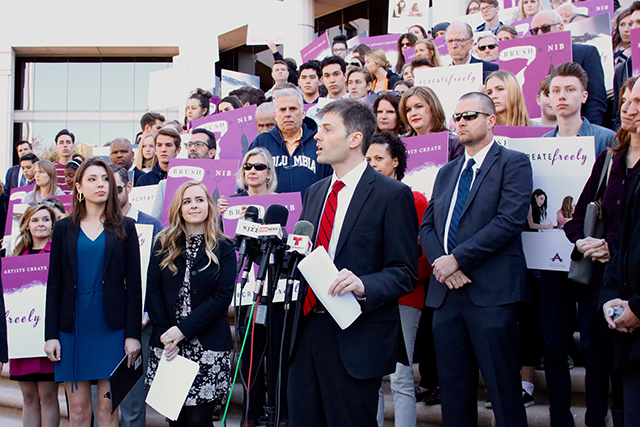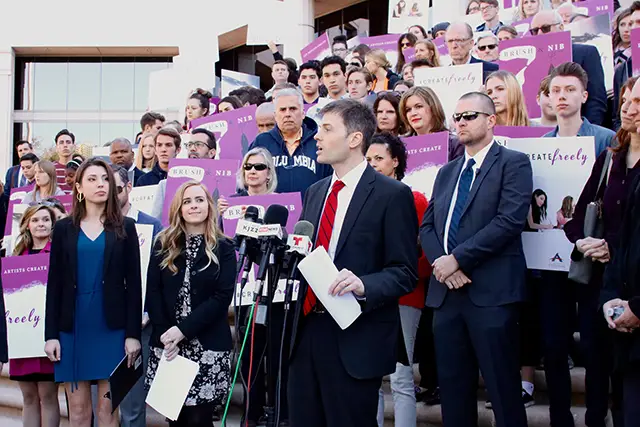
PHOENIX – The Arizona Supreme Court ruled Monday, Sept. 16, the city of Phoenix’s use of an anti-discrimination ordinance violates the freedom of speech and religion of two artists who refuse to create custom invitations for same-sex weddings.
The court’s 4-3 decision for Joanna Duka and Breanna Koski – the owners of Brush & Nib Studio – found the city’s interpretation of its law infringed Arizona’s constitutional protection of free speech and a state law ensuring free exercise of religion. While Duka and Koski say they serve all customers regardless of their sexual orientation, their belief as Christians that marriage is only between a man and a woman prevents them from using their artistic abilities for same-sex ceremonies.
The decision is the latest in a series of court rulings regarding the clash between the legal status of same-sex marriage and the rights of business owners who have declined to offer their services for gay weddings.
In the court’s opinion, Justice Andrew Gould said the city of Phoenix “cannot apply its Human Relations Ordinance” to require Duka and Koski “to create custom wedding invitations celebrating same-sex wedding ceremonies in violation of their sincerely held religious beliefs.
“The rights of free speech and free exercise, so precious to this nation since its founding, are not limited to soft murmurings behind the doors of a person’s home or church, or private conversations with like-minded friends and family,” Gould wrote. “These guarantees protect the right of every American to express their beliefs in public. This includes the right to create and sell words, paintings, and art that express a person’s sincere religious beliefs.”
The state high court ruling is limited to the artists’ creation of custom wedding invitations and does not provide a “blanket exemption” from the ordinance for all of their work, he said.
Duka said at a news conference after the opinion’s release, “Breanna and I will gladly serve everyone, but we cannot create custom artwork celebrating certain events. And the government should not control those expressive decisions.
“Breanna and I are thankful and relieved that the court has upheld not just our freedom,” she said, “but the freedom of other speakers to choose what they say and what they don’t say.”
Alliance Defending Freedom (ADF), which represented the artists in the lawsuit, commended the court’s ruling.
ADF Senior Counsel Jonathan Scruggs told reporters, “Everyone should enjoy the freedom to peacefully live out their beliefs without the fear the government would force them to promote messages that violate their core convictions. Regardless of one’s view on marriage, this is a win for all citizens of Arizona, because a government that can crush Joanna and Breanna can crush any one of us.”
The mayor of Phoenix and some city council members criticized the decision.
“I want to be clear the city of Phoenix does not and will not tolerate hate in any form,” Mayor Kate Gallego said at a news conference. “That doesn’t change with today’s ruling. [A] core tenet of our nation is freedom of religion, but freedom of religion does not mean freedom to discriminate. Personal conviction cannot be used as an excuse for outward bigotry. If you serve someone in our community, you should serve all people in our community.”
In the court’s opinion, Gould wrote, “Nothing in our holding today allows a business to deny access to goods or services to customers based on their sexual orientation or other protected status.”
The ordinance “coerces [Duka and Koski] into abandoning their convictions, and compels them to write celebratory messages with which they disagree, such as ‘come celebrate the wedding of Jim and Jim,’ or ‘share in the joy of the wedding of Sarah and Jane.'”
Michael Whitehead, a Southern Baptist lawyer, wrote a friend-of-the-court brief for the SBC’s Ethics and Religious Liberty Commission (ERLC) in support of the artists. He said an appeal of the decision is not expected because ADF raised issues only under the state constitution and law.
“Although this decision has legal force only in the state of Arizona, it has great persuasive value in other cases across the country,” Whitehead told Baptist Press in written remarks. “The opinion is so well crafted it will pave the way for future cases in federal and state courts. The ripple effect will be national in other compelled-speech cases where government tries to treat religious conscience as though it were invidious discrimination.”
In recent opinions involving gay marriage, the U.S. Supreme Court has said individuals and organizations should be able to maintain their constitutional right to practice their religious belief that marriage is limited to a man and a woman, according to the brief filed by the ERLC, which was joined by eight other organizations.
The Phoenix ordinance prohibits in “places of public accommodation” such as Brush & Nib Studio the refusal of service based on multiple categories, including “sexual orientation” and “gender identity or expression.” The law also bans owners from displaying on a website or by other means its unwillingness to provide services because of any of these classifications.
Last year, a three-judge panel of an Arizona Court of Appeals upheld a lower court’s summary judgment in favor of the city, ruling Duka and Koski had failed to show the law “substantially burdens their religious beliefs by requiring that they provide equal goods and services to same-sex couples.”
Jonathan Whitehead – also a Southern Baptist lawyer and Michael’s son – helped write a brief in support of Duka and Koski on behalf of members of the Arizona legislature. He is on the ERLC’s board of trustees.
Written by Baptist Press, the official news service of the Southern Baptist Convention.

